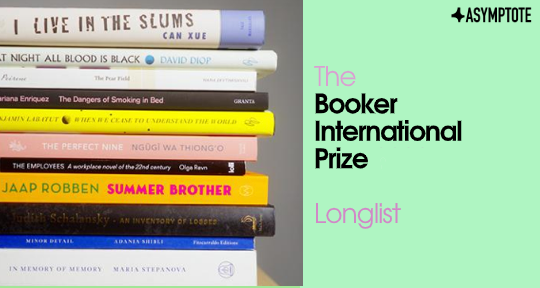Last week, the judges of the International Booker Prize announced the 2021 longlist. The prestigious prize is always followed with great excitement by critics, writers, and readers of international literature, and is particularly pertinent to us here at Asymptote. This year’s eclectic list features eleven languages from twelve countries. While we await the announcement of the six-book shortlist on April 22, let this be your guide through the thirteen books on the longlist.
The announcement of the International Man Booker, which celebrates the finest translated fiction from around the world, is always a pivotal event in the year for those interested in world literature. This year’s judging panel, consisting of Lucy Hughes-Hallett, Aida Edemariam, Neel Mukherjee, Olivette Otele, and George Szirtes, has selected a longlist dominated by newcomers and focusing above all on migration.
A welcome inclusion on the 2021 longlist, which is (as always) extremely Eurocentric, is the renowned Kenyan writer Ngũgĩ wa Thiong’o’s The Perfect Nine: The Epic of Gĩkũyũ and Mũmbi. Written in Gikuyu, this is Ngũgĩ’s first attempt at the epic form and explores the theme of disability through the story of nine sisters journeying to find a magical cure for their youngest sibling, who cannot walk.
Ngũgĩ was previously nominated for the International Booker in 2009 but has made history with this second nomination by becoming the first writer to be nominated for the prize as both author and translator of the same book, and the first nominee writing in an indigenous African language. Given that Ngũgĩ began his writing career in English before resolving to write works in his mother tongue (works for which he was detained by Kenya’s government), this nomination opens the way for much-needed conversations about literature in indigenous languages, as well as about the fascinating practice of self-translation. With the recent controversies surrounding translators of Amanda Gorman’s poetry collection The Hill We Climb, and questions of diversity and visibility of translators, Ngũgĩ’s self-translation adds a new angle to the debate about who gets to translate a text.
Chinese author Can Xue has also been previously nominated for the prize. In 2019, Xue was nominated for Love in the New Millennium, while this year’s nomination is for her first collection of stories, I Live in the Slums (translated by Karen Gernant and Chen Zeping).
For most of the authors on the list, however, their 2021 nomination is a first. As Barbara Halla noted last year, 2020’s list was dominated by “violence, visceral brutality, and even hauntings.” One clear theme amongst all the nominations this year is migration and borders. As the 2021 chair, Lucy Hughes-Hallett said at the announcement:
Every book we’ve read is unique. However a theme does emerge—migration, the pain of it, but also the fruitful interconnectedness of the modern world. Not all writers stay in their native countries. Many do, and write wonderful fiction about their hometowns. But our longlist includes a Czech/Polish author’s vision of a drug-fuelled Swedish underworld, a Dutch author from Chile writing in Spanish about German and Danish scientists, and a Senegalese author writing from France about Africans fighting in a European war.
Palestinian writer Adania Shibli’s nominated book, Minor Detail (translated from Arabic by Elisabeth Jaquette), explores the displacement of Palestinians during the 1948 war and the experience of dispossession. The book is told in two parts: the first recounts the rape and killing of a Palestinian woman by Israeli soldiers in 1949; the second follows a Palestinian woman in the present day who becomes obsessed with the “minor detail” of this story. Of all the nominations, this one stands out for me. At a first reading it is deceptively simple, or rather, exact and precise. But its complexities and, as the title suggests, the full import of its many details develop afterwards, like photographic film, gradually displaying the full contours of the horror and violence behind the narrative. Minor Detail is also formally inventive in the interplay between its two parts. It is an extraordinary work of art that reveals how violence is produced through repetition.
As well as being notable for texts that cross geographical borders, the 2021 longlist features many works crossing the boundaries of traditional genres and experimenting with form. Judith Schalansky’s An Inventory of Losses (translated from German by Jackie Smith) is a series of prose pieces that mix essay, memoir, and fiction. Schalansky describes a variety of objects that have disappeared from the world and considers how we mourn or remember their inevitable destruction. The work, an extract of which was published by Asymptote, functions like an archive: her choice of objects is wide-ranging and expansive. An Inventory of Losses defies easy classification, as does Russian author Maria Stepanova’s In Memory of Memory (translated by Sasha Dugdale). With the judges calling it an “unclassifiable, sui generis book,” In Memory of Memory is Stepanova’s English-language debut. She is highly acclaimed in Russia and this memoir tells her family history through a scrapbook-like method, full of digressions and meanders.
As usual, the list is dominated by indie presses, with Fitzcarraldo Editions and Pushkin Press nominated for two books, while other familiar names are present, such as And Other Stories and Peirene Press. The shortlist will be announced on April 22 before the winner is revealed on June 2.
*****
Read more on the Asymptote blog:

